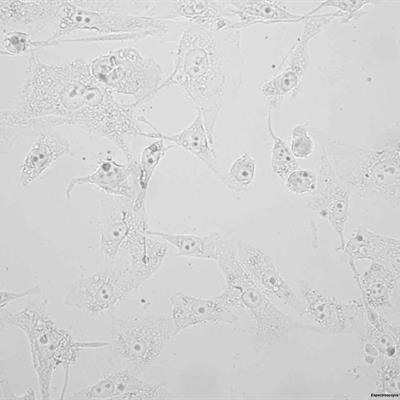In a novel series of experiments, whole human cells were analysed with neutrons for the first time and the results revealed that the water within cells responded to the widely used chemotherapy drug, cisplatin. This study highlights the potential of intracellular water as an additional target for the development of new anticancer drugs, which could lead to higher efficiency, fewer cases of acquired resistance and less deleterious secondary drug effects in the treatment of breast cancer.
In 2014, there were around 11,400 deaths in the UK from breast cancer alone; 31 people died from it every day, and it is the third most common cause of cancer death in the UK.
Metastatic breast cancer, also known as advanced breast cancer, is breast cancer that has spread beyond the primary tumour in the breast to other organs in the body, through invasion of healthy tissues via the circulatory system.
One method for treating various types of cancers, including breast cancer, is chemotherapy – administration of drugs such as cisplatin. This platinum-based drug has been in clinical use since the 1970s. It stops cancer cells from multiplying uncontrollably by binding to and damaging DNA in the cancer cells, which is needed for the growth and division of cells. However, cisplatin can also affect healthy cells, and has severe side effects such as nephrotoxicity (kidney toxicity) and low counts of white and red blood cells, which leave patients susceptible to infection.
To overcome the various negative side effects of chemotherapy, targeted cancer drugs are being developed. The targeted delivery of cancer drugs is more precise in attacking cancer cells, and generally leaves healthy cells unharmed.
Of the chosen targets for cancer drug development, the water within cells has been overlooked. Around 80% of a cell’s mass is water, and this intracellular water plays a key role in vital mechanisms within cells. It is the dynamical matrix in which all biochemical and biophysical processes occur.
Scientists from the University of Coimbra in Portugal are testing the feasibility of intracellular water to act as a new anticancer drug target. For the first time, the team put whole human breast cancer cells in the neutron beam and measured the effect of cisplatin on their intracellular water. Results of these experiments at the ISIS Neutron and Muon Source have shown that intracellular water responds to the drug, and therefore may be considered as a new target, which will be of the utmost relevance for the future development of multi-targeted anticancer drugs.
The study was published in the Royal Society of Chemistry journal,
Physical Chemistry Chemical Physics.

Image shows human breast cancer cells. Cisplatin stops cancer cells from multiplying uncontrollably by binding to and damaging DNA in the cancer cells, which is needed for the growth and division of cells. Image courtesy of Maria Paula Marques, University of Coimbra. View full-size image
Joint lead author, Dr Maria Paula Marques from the University of Coimbra said, “If a drug is multi-targeted, it has a much higher effect at a lower dosage because it is hitting several targets at the same time. If one of those targets is water, then through the water the drug can affect a lot of biomolecules in the cell, like a network.”
Resistance to drugs arises when there are competitive reactions in the cell, meaning the drug may react with molecules that it’s not intended for. Therefore the amount of drug reaching the tumour is lowered. However, if on the way to the target the drug affects the intracellular water, it begins to damage the cell earlier on.
Joint lead author, Dr Luís Alberto Batista de Carvalho, University of Coimbra said, “We would need a much lower dosage of the drug to treat the cancer, meaning less acquired resistance, fewer side effects, and it’s also cheaper.”
The human breast cancer cells used in the study were grown from cell lines created from removed tumour tissue. The cells were grown and then incubated with cisplatin for 48 hours at the Research Complex at Harwell, and were then immediately taken to the TOSCA and OSIRIS instruments at ISIS.
Neutron vibrational spectroscopy experiments on TOSCA enabled the team to ‘see’ the local structure of the water molecules within the cell, by comparing their vibrational signatures with known measurements, usually from ice. With increasing concentrations of cisplatin, the drug interrupted the characteristic structure of intracellular water.
Separately, quasi-elastic neutron scattering experiments were undertaken on OSIRIS to study the intracellular water dynamics, as well as local motions of biological molecules within the cell on the picosecond timescale. The team found incubation with cisplatin triggered a reduced mobility of intracellular water with increasing concentrations of cisplatin.
Dr Victoria Garcia Sakai, Instrument Scientist for OSIRIS said, "This seminal work highlights the power of neutron scattering as a tool for understanding very complex but medically relevant systems. The unique partnership between neutrons and hydrogen has enabled us to probe the effects of cisplatin drug on the structure and dynamics of intracellular water in human cancerous cells. We hope the results are a step towards designing more effective breast cancer treatments."
Taking these results on board, the team are now developing a new cisplatin-like palladium-based anticancer drug that may also target intracellular water and will be tested on whole human breast cancer cells at ISIS in February 2017.
Emily Mobley
Marques, M.P.M et al.
Marques, M.P.M et al. 2017. ‘Intracellular water – an overlooked drug target? Cisplatin impact in cancer cells probed by neutrons.’ Phys. Chem. Chem. Phys., DOI:
10.1039/C6CP05198G [Online]
